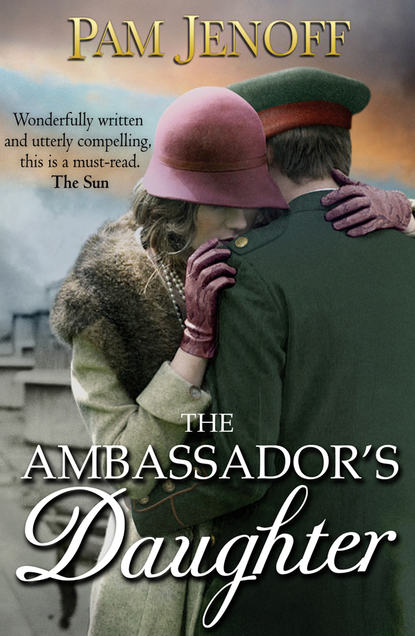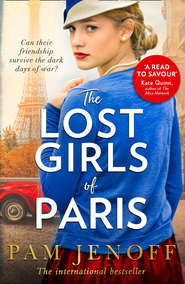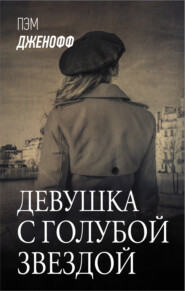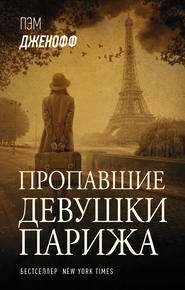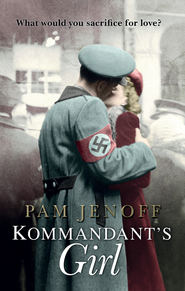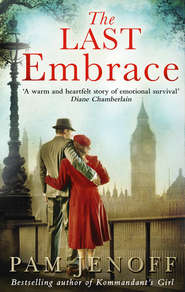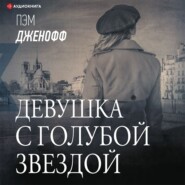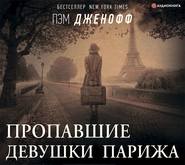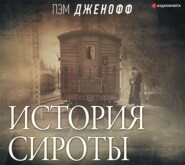По всем вопросам обращайтесь на: info@litportal.ru
(©) 2003-2024.
✖
The Ambassador's Daughter
Настройки чтения
Размер шрифта
Высота строк
Поля
I can hear the party before I can see it, laugher spilling forth down the streets of Neuilly-sur-Seine. We turn the corner and a house in the middle of the street stands as a beacon, light beaming from within. It is not the largest on the block of this affluent Parisian neighborhood, but it gives the impression of being the most grand—flower boxes overflow with blooms too early in the season to be native and great ribbons of silk batting adorn the balconies, as though Armistice Day was last week and not months ago.
I stop midstreet, drawing my flimsy shawl against the evening, which is pleasant but chilly enough to remind me that it is not summer yet. Normally I would have dreaded such an affair. But after weeks locked away in dreary Versailles, I somehow welcome the return to the city and its bustle, even with Tante Celia as my host. There is no room in Versailles for Celia, a woman without official status, so she has remained behind in Paris. Papa is lonely for her, I can tell, by his quieter than usual demeanor, the excuses he has found to stay over in the city after dinners.
Celia touches my elbow as we climb the stairs. “You’ve heard of Elsa Maxwell, n’est-ce pas?” She jumps indiscriminately between German and French.
“Of course.” I reply in German, not bothering to lower my voice. It’s not as if anybody will be fooled into believing we are someone else. Elsa Maxwell is ubiquitous. A reporter in the softest sense of the word, she is in fact a social doyenne whose real fame came from hosting soirees such as this. “She threw parties in London during the war.” I neglect to mention that I had not been to any of them.
Inside, the house is hot as August, too many bodies pressed close, trying to move in all directions. The party has been going on for hours, the festive atmosphere a train we had missed. A far cry from the stuffy receptions I had attended with Papa, there is no pretense of restraint. The men have loosened or in some cases removed their ties. The women have kicked off their shoes and those who have not bobbed their hair have let it loose from its pins. The women who had come to Paris were of an unusual sort—would-be writers and entertainers and journalists whose free-spirited nature surely gave consternation to the wives who had been left at home. Their dresses are the latest fashions, Oriental-themed shifts, Bohemian frocks without any pretense of a corset. I feel positively frumpy in my staid rose party dress, though not as much so as Celia, who with her high collar and crinolines stands out like a peacock, or a jester in an Elizabethan play.
Bodies fill the makeshift dance floor in the center of the great room, moving in strange new ways to the lively jazz music that blares from a gramophone. Two women dance as though one was a man, pressed close together. A strange scent, something strong like burning flowers, mixes with the faint odor of sweat in the air. There is a kind of desperation to the revelry, especially among the women. It is more than just the wiping away of cobwebs and sorrow of a world struggling to live again. The chance for a normal life with a husband and children has been denied to so many, a generation of would-be suitors gone to the trenches. The men who were left were the oddities, those who had escaped the military for some sort of infirmity, and those like Stefan who came back broken.
“All of this immorality,” Celia remarks in French, “Everyone’s roles confused, the lines between men and women gone, brought about by women going into work.”
“You really think that’s the cause of all of this?” My voice is incredulous. “There are so many other reasons. What about the desperation of the war, not to mention the influx of large numbers of soldiers now with too much time on their hands, so far from home?” Celia sniffs, unpersuaded.
“It’s a sight, isn’t it?” a woman next to me remarks idly. I nod, my eyes traveling toward the dance floor where the two women are locked together now, nearly kissing. There is something about being in Paris here, away from familial and societal expectations back home, that has given people license to act this way. “Austrians at the party, as if they were our friends,” she adds. I step back, stung. The woman had not been referring to the outlandish behavior at all, but was incensed by our kind being here, the enemy treated as equals.
“Come.” I follow Celia through the packed room. She disappears into the crowd ahead of me and, after searching above the sea of heads in vain, I give up trying to keep up and instead make my way to one of the open windows. The cold, crisp air is a welcome relief against my face, a reprieve from the swaths of perfumed smoke.
Outside a woman in a tattered work dress picks through the rubbish in the alley adjacent to the house. Though the homeless have become an increasingly common sight in Paris, I am taken aback by the woman, not much older than myself, searching the garbage for food. What does she think of us being here with all of our parties and revelry and noise? I imagine a husband taken at the front, hungry children back home. Sensing me, she looks up and her eyes widen with alarm, fearful that I will reproach or report her for being there. Desperately I reach into my purse and fling coins through the window, ashamed by the callousness of the gesture, as well as the inadequacy of my aid.
Celia is at my arm again, this time with our hostess, a buxom woman with short brown hair and a broad smile I recognize from the society pages of the newspaper. “Elsa, you remember …” I hold my breath, waiting for the woman to deny our having met in London.
But Elsa Maxwell, accustomed to traveling in wide circles and knowing people less often than she is known, sweeps me into a firm hug that has none of the airiness of the kisses so often exchanged here. “Darling!” Celia watches, eyes wide, apparently having bought the subterfuge. Elsa releases me. “If you’ll excuse me, I must get everyone started on the game.”
“Game?” But she has already moved on, leaving a burst of Chanel in her wake.
A moment later a bell rings and Elsa appears on the landing of the broad staircase in the middle of the foyer, commanding a presence well beyond what her rather plain appearance suggests. The din in the room instantly dulls, but there is still too much noise for me to hear well. She makes an announcement, holding up papers of some sort. A whisper of excitement blows through the crowd. Then she throws the papers into the air with a flourish and they scatter like confetti.
I turn to Tante Celia, confused. “A scavenger game,” she exclaims excitedly, scrambling to grab one of the sheets. “It’s a treasure hunt,” she explains, placing great importance on each syllable.
She scans the paper, then passes it to me. It is a shopping list of the oddest sort: a pair of opera glasses, a man’s swimming costume. Some of the items are phrased in riddle. “I don’t understand. How are we to buy these things if the shops are closed?”
She titters with superiority, staring toward the door. “We don’t buy them. We find them,” she replies, gaily as a child. Are we seriously to run around the streets hunting in the darkness?
“I don’t …” I start to beg off, following her outside. But Celia has already formed a foursome with two Swedes and together they set off toward the dense trees of the Bois de Boulogne.
As I start toward the massive park, my ankle twists, a sharp but fleeting pain. Celia turns back impatiently. The heel of my shoe, which caught the cobblestone, is cracked and, sensing my moment, I pull intentionally until the heel snaps. “It’s broken,” I lament, trying to fill my voice with disappointment. “You go on.”
Celia hesitates. “If you’re sure you’ll be fine.” Not waiting for my response, she follows the Swedes, who have already run off into the night, intent on the errand of finding a newspaper that is more than a month old. As she disappears into the trees, I sigh. I do not begrudge her excitement when she has so little to call her own. And she would not have left me if I was in real distress.
I limp back toward the house. The party has faded, the salon empty except for a rowdy group of men in the smoking room, a couple kissing shamelessly on one of the settees. I find the butler and ask him to call a taxi.
It is nearly midnight when the cab reaches Versailles. I pay the driver and step out, then peer across the road toward the Hôtel des Réservoirs, where lights still burn on the ground floor despite the late hour. Curious, I walk down the street. In a first-floor library, a man works intensely behind a desk, head low, bathed in yellow light. It is the German naval officer who picked up my scarf. I watch him, transfixed. He looks to be about thirty. He lifts his head and catches my eye, holding my glance for a second longer than he had earlier at the arrival. Then he stands and walks from the room. I step back into the shadows. How rude of me. He obviously minded the intrusion. But then the front door to the hotel opens and I see him silhouetted against the light.
“Can I help you, mademoiselle? We are not a zoo.”
I flush, seized with the urge to run. “No, of course not.” Then I take a step forward, out of the shadows. “It’s fraulein, actually.” I am quick to identify myself as a German out of the earshot of others, as if our kindred citizenship might excuse my watching him. I shift my weight awkwardly to my right foot. “I mean, Margot. Margot Rosenthal.”
“The professor’s daughter?” I nod. “I’m Georg Richwalder. I’m the military attaché to the delegation.”
“I’m sorry if I disturbed you. I broke my heel and was just pausing.” I hold up the shoe as evidence, take a step through the gate. He walks down the steps toward me. He is taller than I thought and I crane my neck upward to meet his eyes rather than stare at his chest as we speak.
“May I?”
I hand the shoe to him.
“I can fix this, I think.”
I eye him skeptically.
“You learn to be handy in a great many ways when you’re at sea. Would you like to come in for some tea while I try?”
I hesitate. The library behind him looks warm and inviting, the quiet and solitude a welcome contrast to the Maxwell party. But it wouldn’t be proper. “No, thank you. I’ll just be on my way.”
“Wait here,” he instructs firmly, a man who is used to giving orders. I shiver at his commanding tone. “I’ll bring the tools—and some tea—outside.”
I sit down on the step. A few minutes later he emerges with two cups of tea and a small kit. “I’m sorry to have disturbed you,” I say.
“Not at all.” He smiles and in that instant seems not at all the terrifying soldier I’d glimpsed during the delegation’s arrival. A chink in the armor. “After so much time on the train, the fresh air is refreshing. The trip was exceedingly long. We sat at one point for eighteen hours for some reason known only to the French.” He is wearing the same dark blue uniform as earlier today, but the jacket is unbuttoned, the shirt loosened at the collar.
I run my hand along the step, the stone hard and rough beneath my fingertips. “And the hotel … is it quite dreadful?”
“It’s not bad, really. I mean in its heyday I’m sure it was quite grand. But I spent the better part of the four years on a ship, so I may not be the best judge of comfort.”
“You were in the navy, weren’t you?”
“I was on the SMS König, the crown jewel of His Majesty’s High Seas Fleet.” The pride in his voice is reminiscent of the prewar days, taking me back to the parades down the Unter den Linden, young girls pressing sandwiches and sweets into the hands of newly minted soldiers as they made their way to the station. “Even as a senior officer, my quarters were no bigger than a closet. The hotel has reasonably clean linen and fresh water and I’m not awakened to the sound of gunfire each morning.” He smiles. “It’s paradise. And the library is wonderful. I shall enjoy working there at night after the rest of the delegation has retired. They’re mostly older, and we don’t have much in common. But it’s not a social occasion.”
“And your family—did they mind being left back home?” The question comes out more prying than I intended. “I mean only that I’ve heard some of the men lamenting that their families couldn’t enjoy Paris.”
“No.” An image pops into my mind of a Frau Richwalder, elegant and well coiffed, keeping the house running back in Germany. “That is, there’s no one. I’m not married. Not so much to enjoy here these days, anyway.”
“I suppose not.” The German delegation was almost entirely confined to the hotel except for sanctioned meetings and a lone excursion.
“There.” He hands me my shoe, neatly fixed.
“It’s good as new. Danke.” He watches me, as though lost in thought. Between my mud-streaked dress earlier and broken shoe now, he must think me a wreck.
“Aren’t you cold?”
I shake my head stubbornly.
“That’s hardly a suitable coat.”
“It’s the fashion.” I struggle to keep the sarcasm from my voice.
“Well, no one is here to see.” He takes his coat and puts it around my shoulders in a strange, too-familiar gesture.





